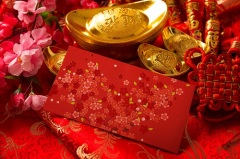Chinese New Year in China

Event Date
Chinese New Year - Chun Jie, which means Spring Festival, is the most important holiday for the Chinese, it has been celebrated for more than two thousand years. It falls on the second new moon after the winter solstice, between January 12 and February 19. With the introduction of the Gregorian calendar, this holiday was called the “holiday of spring” in order to separate it from the New Year according to the Western style. In everyday life, Chun Jie is called “Nyan” (Nian means “year”).
According to legend, Nian is a terrible, fierce monster with horns on his head, who lived in ancient China. All the year round he was in the depths of the sea and only on the eve of the new year he got out of the water, broke into the villages, devoured cattle there and destroyed people. Therefore, local peasants were very afraid of him and every year before the new year came, whole families left the village and ran into the depths of the mountains to hide from the predatory beast Nanny.
One day, on the eve of the new year, when the villagers of the village of Tao hua (“Peach flowers”), supporting the old ones, carrying babies, left the village in horror, an old beggar with a silver mustache came. In one hand he held a cane, and in the other a sack.
At that time, some closed the windows or locked the house, others collected things on the road, and others drove bulls or sheep, in a word, at that time everyone in the village was busy and everyone was in a panic, so no one paid particular attention to this beggar. the old man. Only one old woman, who lived in the eastern part of the village, gave him some food and began to persuade him to quickly leave from here to avoid meeting the beast Nyan. However, this old man, stroking his mustache, grinned: "If you allow me to stay in your house for one night, then I will drive Nanny out of the village."
The old woman looked at the old man with surprise and noticed that this gray-haired old man with a youthful face looked strong and vigorous, but she nevertheless began to persuade him to climb the mountain to hide from the predatory Nanny. However, the poor old man insisted on his own, and the old woman had to leave alone.
By midnight Nian broke into the village. This time, he discovered that something was wrong in the village, as it had been all of the past. I was horrified to see Nian, that in the house of the old woman the fire was burning, and the doors were painted red. And when he reached the entrance to the house, there was a crash of bamboo flappers in the courtyard. He did not dare enter the courtyard.
It turns out that Nian is afraid of red color, bright flames and loud noise. At this time, the gates opened, the old beggar man wearing a red robe came out of them and loudly laughed. Seeing this picture, Nyan was very scared and ran away in a panic.
On the second day, that is, on the first day of the New Year, the villagers returned to the village. Seeing that everything in their homes is whole, they were very surprised. At this time, the old woman understood what was the matter, and told the villagers about the promise of an old beggar. Hearing the story of the old woman, all the villagers rejoiced, dressed up in new clothes, congratulating each other on the advent of peace, happiness and well-being. This story quickly spread to neighboring villages, and everyone soon learned how to cast out the beast Nanny.
Since then, every year on New Year's Eve, people stick red double inscriptions on the doors, fire flares, fires in houses, people do not go to bed and stay awake all night, which in Chinese is called “Sui Show” - “preserve the year”.
Chinese people call the New Year's Eve “the night of the meeting after separation”. For them, this is the most important moment of the year. The whole family gathers at the festive table for the New Year's dinner, which is characterized by an abundance and variety of dishes. For example, a New Year's dinner is not complete without dishes from chicken meat, fish and doufu - bean curd, which we call tofu, because in Chinese the names of these products are consonant with the words meaning “happiness” and “prosperity”.
In the north of China, it is customary to eat dumplings (jiaozi) for the new year, and in the south - “nyango” (slices made from sticky rice). Northerners prefer dumplings, because in Chinese the word "jiaozi" is consonant with the words "seeing the old and meeting the new." In addition, dumplings resemble traditional ingots of gold and silver in their shape and symbolize a desire for wealth. For the same reason, Southerners eat “Nyangao”, symbolizing the improvement of life every year.
Weekends last seven days. The first five days of the new year are for meetings. Relatives, friends, classmates, colleagues visit and congratulate each other on the New Year.
The tradition of giving gifts is not very common in China. On Chun Jie, the traditional gift is I-sui qian - pocket money in special red envelopes that are usually given to children. Observing old customs, money is given to any child who came to the house in the first 15 days of the New Year. If a red envelope is not at hand, do not worry, you can do without it.
On the Spring Festival, several noisy folk festivals and fairs are held for several days in a row, where they perform dances of lion and dragons, round dances of "land boats", numbers on stilts. New Year's festivities end after the Lantern Festival, at fifteen














